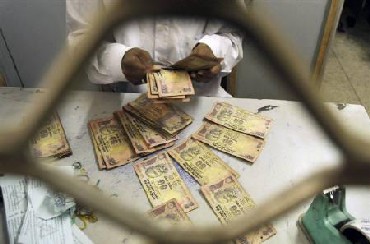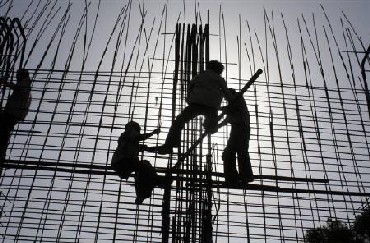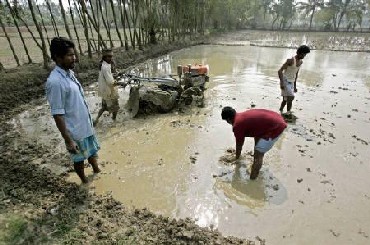 | « Back to article | Print this article |
What India Inc wants FM to do
"Exempt long term capital gains on sale of investment in equity for non life insurers"
-- R.K. Kaul, Chairman cum Managing Director, The Oriental Insurance Co. Ltd
With implementation of DTC from FY 2012-13, almost certain, FM is not likely to tinker with Tax structure except some minor changes here and there.
Therefore, there is unlikely to be any relief on corporate tax rate structure, though minor upward revision is expected in personal income tax exemption limit to absorb the impact of inflation. It is also likely that MAT Rate may be increased to 20 per cent.
However, with windfall of 3G spectrum out of way in the next financial year, FM may be looking for some other sources of revenue to cover the gap.
There is already an indication that with Economic Growth right on the track, the stimulus package given earlier to stem the deceleration in economy, may be rolled back with 2% increase in Vat and Service Tax.
However, increasing crude oil prices and high inflation may force FM to curtail excise duty on petroleum products, to keep petrol and diesel prices in check or subsidy to oil companies will have to be increased.
With limited upside in revenue, the focus of the budget will be more on controlling expenditure side.
However, with elections in certain states falling due it will be hard task to curtail budget for populist schemes and controlling fiscal deficit will be daunting task for FM.
Click NEXT to read more...
What India Inc wants FM to do
Under the prevailing conditions, no major relief is expected from this budget for both Corporate and individual tax payers.
As far as insurance sector is concerned, we expect the budget to address the following issues affecting the non-life insurance sector;
a. We expect that non-life insurance sector should be allowed exemption on long term capital gains arising from sale of investment in equity inline with the exemption allowed to other sectors.
b. Remittance made to foreign reinsurers under reinsurance arrangements should be kept out the scope of section 195 of the Income Tax Act for deduction of TDS.
c. The limit for rebate for mediclaim premium under section 80D should be increased from Rs 15000 to Rs 25000 for individuals to provide boost to the health insurance. This will also allow people to opt for higher coverage to cover higher medical cost.
d. Minimum exemption limit for service tax should be increased from present Rs 50 to Rs 1000, as there are hardly any policies carrying premium of less than Rs 50
Click NEXT to read more...
What India Inc wants FM to do
"Final deficit will overshoot the target"
-Leif Eskesen, Economist, HSBC Global Research, Singapore
The FY2011 budget rightly targeted a resumption of fiscal consolidation as the economic recovery was on track. As the fiscal year progressed, tax revenues proved more buoyant than budgeted due to stronger growth and progress on tax administration.
However, the biggest surprise came when the bids on the 3G licences came in and delivered a nice windfall gain.
The government was, therefore, in a position to beat the budget target by a wide margin that is until extra-budgetary demands pushed up expenditures.
Still, the deficit for FY 2011 is expected to outperform the 5.5 per cent of GDP budget target.
For FY 2012, the government is expected to stick to the fiscal consolidation plan and target a central government deficit target of 4.8 per cent of GDP to demonstrate commitment to the medium term plan and give RBI a helping hand fighting inflation.
However, it will not be easy to achieve this, to say the least. For one, the government will have a big revenue gap to fill in the absence of 3G and wireless spectrum sales.
Also, with food and commodity price inflation high, subsidies will go up and the food security bill could also kick in and add to spending pressures.
Click NEXT to read more...
What India Inc wants FM to do
Finally, indexation of the rural employment guarantee program will push up spending. The government is also likely to ramp up infrastructure outlays and support for the agricultural sector to ease supply side constraints.
So, how will it deliver the targeted consolidation, especially when faced with important state elections and an already difficult political environment?
Well, there is clearly a risk that it will only deliver it on paper, relying on optimistic growth assumptions and leaving out inevitable expenditure hikes to extra-budgetary sessions later.
However, the government is at least expected to try, although we believe the final deficit will turn out higher than budgeted.
Steps could include rolling back previous stimulus measures, broadening indirect tax bases, and scaling back non-essential spending.
However, the pending tax reforms (GST and DTC) will not come on-stream this year and the likelihood of further subsidy reforms are slim-to-none given inflation pressures and the current political setting.
"Accord Industry status to real estate, bestow priority sector status for real estate lending"
- Rajamannar Ramaswamy, Group Managing Director, Inno Group
"Interest on home loans have to be made more affordable so as to make home buying more attractive. Providing shelter to all has been one of the key objectives of all successive governments.
However, the policy frame work is not encouraging in this direction. According industry status to real estate sector and making lending to real estate as a priority sector lending will go a long way to reduce the cost of funds and accelerate the sectoral growth.
On a personal front, it would be great to see a liberalised tax slab and an increased basic exemption limit in line with inflation so as to maintain, if not increase the real income in the hands of the middle class".
Click NEXT to read more...
What India Inc wants FM to do
"Allow transfer of units from the STPI to SEZ which could continue the current tax break"
- Ravi Pandit, Chairman and Group CEO, KPIT Cummins Infosystems Ltd
Investments in clean technology: KPIT Cummins has a strong focus on clean technologies, for example it has come up with Revolo a plug-in parallel hybrid that can convert a normal car into a hybrid car.
Hybrids will contribute extensively towards cleaner environment and if these are put on the same footing as the electric vehicles in terms of excise duties, it will be a significant boost for cleaner environment and it would also help KPIT Cummins as a company.
Investment in people and infrastructure development: There is a lot that needs to be done about the supply side constraints especially by making investments in the soft as well as the hard side.
The shortage of qualified people is plaguing our industry. The increase in demand with a lower supply of software professionals is pushing the cost especially the salary cost.
If the economy has to grow as a whole at 8 to 9 per cent all the sectors of the economy will need lot of resources. If software as an industry has to grow by 20 to 25 per cent there are going to be supply side issues.
So over the long term improving the supply situation by investing a lot in education across the various layers will help not just a software industry but every industry in the country.
Click NEXT to read more...
What India Inc wants FM to do
So, significant investments need to be made in infrastructure of education, including opening up the education sector. These will have a long-term positive impact on the software industry.
Extension of STPI: An extension of the STPI would mean a lot especially to the small and upcoming companies.
Many companies even companies like us have now moved into SEZs and so we will derive the benefits, but I believe that software industry in general has a lot of growing small companies and for them the continuation of STPI can make a big difference.
If there is no extension, we will have to work on higher productivity while achieving higher incomes.
There are two options that could be considered: either continuing the STPI scheme or allowing transfer of units from the STPI to SEZ which could kind of continue the current tax break. This will also still help a certain size of companies.
I think continuation of STPI would help the lot of the smaller members of the industry.
"Continue thrust on infrastructure sector which would benefit the economy as a whole"
- Rajnish Kumar, Executive Vice President, Fullerton Securities and Wealth Advisors Ltd.
We expect the government to announce a populist budget with thrust on development spending. Revenue receipts from auction of 3G spectrum and Broadband Wireless Access (BWA) resulted into lower market borrowings. Thus, we expect fiscal deficit to be about 4.5% of GDP in this budget vs. 5.5% in the previous budget.
We expect more clarity on the implementation of the Direct Tax Code (DTC) and the Goods and Services Tax (GST) that will have long term positive implication on government finance. However, rising crude oil prices and the absence of major reforms in farm & fertilizer sector poses threat to fiscal consolidation.
Click NEXT to read more...
What India Inc wants FM to do
The government is likely to raise import barriers for capital equipment, especially power equipment to facilitate domestic players. For the auto sector the government may roll back excise duty sops as seen in the previous budget.
The IT industry would like to see extension of the tax exemption clause under Section 10 A/10 B for software technology parks (STPI) which is due to expire in March 2011.
We would like to see continued thrust on infrastructure sector which would benefit the economy as a whole.
For the banking and financial sector we anticipate a reduction in the tenure limit for tax exempt deposits from five years to three years.
Another expectation is that of a hike in limit of refinancing from India Infrastructure Finance Company (IIFCL) to commercial bank loans for public-private partnership (PPP) projects in critical sectors from the current Rs 6000 crore (Rs 60 billion).
We expect some relaxation of FDI norms in the media sector."







